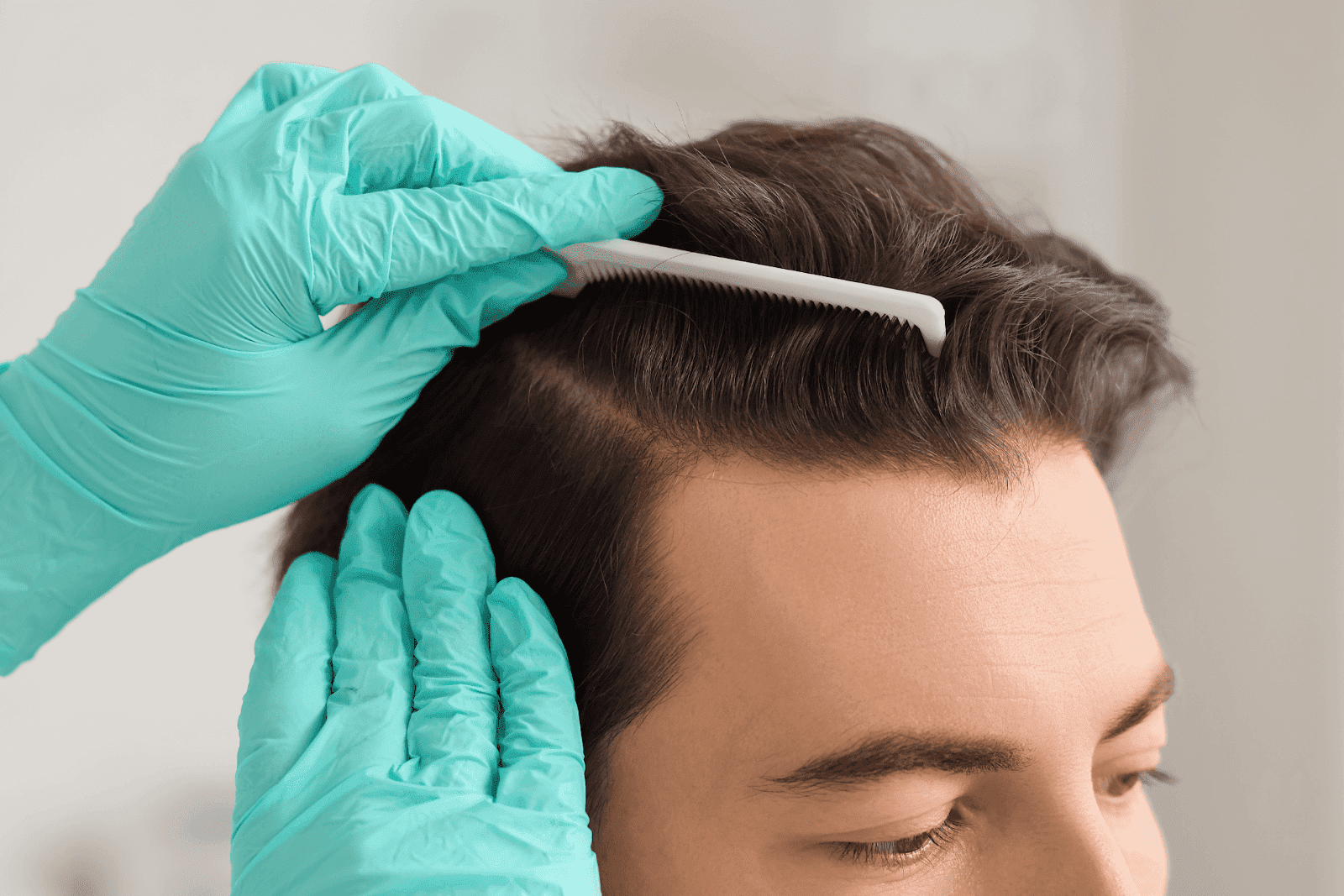Does Tirzepatide Cause Hair Loss?
Understanding Tirzepatide and Its UsesTirzepatide is an innovative medication that has gained attention for its effectiveness in managing type 2 diabetes and, more recently, [...]
Read More
Medically reviewed by Alan Lucks | MD, Alan Lucks MDPC Private Practice - New York on October 28th, 2025.
Clinical trials show no direct hair loss from the medication itself, but up to 10% of patients experience temporary shedding during treatment cycles.
Rapid weight loss exceeding 1-2 pounds per week can trigger telogen effluvium, causing hair follicles to enter a 2-3 month resting phase before shedding.
Nutritional deficiencies—particularly protein, iron, zinc, and B vitamins—become common as caloric intake drops significantly during treatment.
Hair thinning typically begins 2-4 months after starting therapy and usually reverses within 6-12 months once weight stabilizes and nutrition improves.
Maintaining at least 1.2-1.6 grams of protein per kilogram of body weight daily can help minimize hair loss during active weight loss phases.
Tirzepatide is an innovative medication that has gained attention for its effectiveness in managing type 2 diabetes and, more recently, for its potential in weight management. It is a once-weekly injectable drug that works by mimicking the effects of two hormones, GLP-1 and GIP, which help regulate blood sugar levels and appetite. As a result, many patients experience improved glycemic control and weight loss, making tirzepatide a promising option for those struggling with metabolic conditions. In clinical trials, participants have reported significant reductions in HbA1c levels, which is a key indicator of long-term blood sugar control, along with notable weight loss that can lead to enhanced overall health and quality of life.
As with any medication, patients often have concerns about possible side effects. One question that has surfaced is whether tirzepatide causes hair loss. This article explores the available evidence on this topic, helping you understand the risks and what to do if you experience hair thinning or loss while on tirzepatide. While hair loss is not listed as a common side effect, some users have reported it prompting further investigation into the relationship between tirzepatide and hair health. It’s essential to consider that individual responses to medications can vary widely and that factors such as underlying health conditions, nutritional status, and concurrent medications may also play significant roles in hair loss.
Moreover, the mechanism of action of tirzepatide extends beyond just blood sugar regulation; it also influences metabolic pathways that can affect various bodily functions. For instance, the dual action of GLP-1 and GIP not only aids in insulin secretion but also promotes a feeling of fullness, which can help reduce caloric intake. This multifaceted approach not only assists in diabetes management but also offers a holistic strategy for weight loss, appealing to a broader audience seeking to improve their health. Additionally, ongoing research is exploring the long-term effects of tirzepatide, including its impact on cardiovascular health and its potential benefits for patients with obesity-related complications. Common Side Effects of Tirzepatide
Common Side Effects of Tirzepatide
Before diving into the specifics of hair loss, it is important to understand the typical side effects associated with tirzepatide. Clinical trials and patient reports indicate that the most common side effects include nausea, vomiting, diarrhea, decreased appetite, and mild gastrointestinal discomfort. These side effects are generally mild to moderate and tend to improve over time as the body adjusts to the medication.
Serious side effects are rare but can include pancreatitis or allergic reactions. Patients are advised to consult their healthcare provider if they experience severe symptoms. However, hair loss is not commonly listed among the known side effects in clinical studies or official prescribing information.
Currently, there is no strong scientific evidence or clinical data directly linking tirzepatide to hair loss but it can be a side effect in up to ten percent of people on tirzepatide. Hair loss, medically known as alopecia, can be caused by a variety of factors, including genetics, stress, nutritional deficiencies, hormonal changes, and certain medications. While some drugs, such as chemotherapy agents or specific blood thinners, are well-documented to cause hair loss, tirzepatide does not fall into this category.
That said, individual responses to medications can vary. Some patients might notice hair thinning or shedding during treatment, but this could be due to underlying health conditions, stress related to chronic illness, or other medications being taken concurrently. If hair loss occurs, it is important to consider these other factors and discuss them with a healthcare professional.
One possible explanation for hair loss during tirzepatide therapy is rapid weight loss. Tirzepatide has been shown to promote significant weight reduction in some patients, and rapid weight loss itself can sometimes trigger a temporary form of hair shedding called telogen effluvium. This condition occurs when the body experiences stress, causing hair follicles to enter a resting phase and shed more than usual.
Additionally, changes in diet or nutrient absorption during weight loss can contribute to hair health issues. Ensuring adequate intake of vitamins and minerals such as iron, zinc, and biotin is essential for maintaining healthy hair growth.
If you notice hair thinning or increased shedding while on tirzepatide, it is important not to panic. Hair loss can be temporary and reversible, especially if it is related to weight loss or stress. The first step is to consult a healthcare provider who can evaluate your symptoms in context, rule out other causes, and recommend appropriate interventions.
For convenient and expert medical advice, consider using telehealth services like Doctronic.ai. Doctronic offers 24/7 access to licensed doctors across all 50 states, providing affordable video visits for personalized care. Their AI-powered system can help synthesize your medical history and provide tailored recommendations quickly and efficiently.
Doctors may suggest blood tests to check for nutritional deficiencies or hormonal imbalances and may recommend supplements or lifestyle changes to support hair health. In some cases, adjusting the medication regimen might be necessary, but this should only be done under medical supervision.
Maintaining healthy hair while on any medication involves a combination of good nutrition, stress management, and proper hair care. Eating a balanced diet rich in protein, vitamins, and minerals supports hair follicle function. Avoiding harsh hair treatments and minimizing heat styling can also reduce hair breakage and loss.
Stress reduction techniques such as mindfulness, exercise, and adequate sleep can help mitigate hair loss caused by telogen effluvium. Staying hydrated and avoiding smoking further supports overall hair and scalp health.
Modern technology is transforming how patients manage their health. Doctronic.ai uses advanced AI to provide fast, accurate answers to health questions, including concerns about medication side effects like hair loss. This AI doctor draws on the latest peer-reviewed medical research to offer evidence-based advice and can remember your medical history to personalize care.
Such tools empower patients to make informed decisions and get timely medical support without the usual barriers of cost or access. Whether you want a second opinion on tirzepatide side effects or need guidance on hair loss management, AI-powered telehealth can be a valuable resource.
While hair loss can be distressing, it is important to consider the overall benefits of tirzepatide in managing diabetes and obesity-related health risks. Effective blood sugar control and weight management can significantly reduce the risk of complications such as heart disease, kidney damage, and nerve problems.
If hair loss occurs, it should be weighed against these benefits and addressed with professional support. Open communication with your healthcare provider ensures that any side effects are managed appropriately without compromising the effectiveness of your treatment.
 Tirzepatide and Hair Loss
Tirzepatide and Hair LossTo date, tirzepatide is not known to directly cause hair loss. However, secondary factors such as rapid weight loss or nutritional changes may contribute to hair shedding in some individuals. If you experience hair loss while taking tirzepatide, consulting a healthcare professional is crucial to identify the cause and find effective solutions.
Leveraging telehealth platforms like Doctronic.ai can provide quick, affordable access to medical expertise, helping you navigate side effects and maintain your overall health. With the right support, you can continue to benefit from tirzepatide’s promising effects while keeping your hair and well-being in check.
If you're concerned about hair loss while taking tirzepatide or have other health questions, Doctronic is here to provide fast, personalized answers. Our AI-powered doctor is available 24/7 to offer you the most modern medical advice without the wait. With over 10 million users and growing, experience how our limitless patience and tailored care can support your health journey. Skip the line. Talk to an AI Doctor Now, for free.
Hair shedding affects roughly 1 in 10 patients but stems from rapid weight changes and reduced nutrition rather than direct medication effects. Focus on adequate protein intake and consider supplements to support hair health during treatment. If you're experiencing significant thinning, Doctronic can help assess whether nutritional deficiencies or other factors need attention.
Understanding Tirzepatide and Its UsesTirzepatide is an innovative medication that has gained attention for its effectiveness in managing type 2 diabetes and, more recently, [...]
Read More